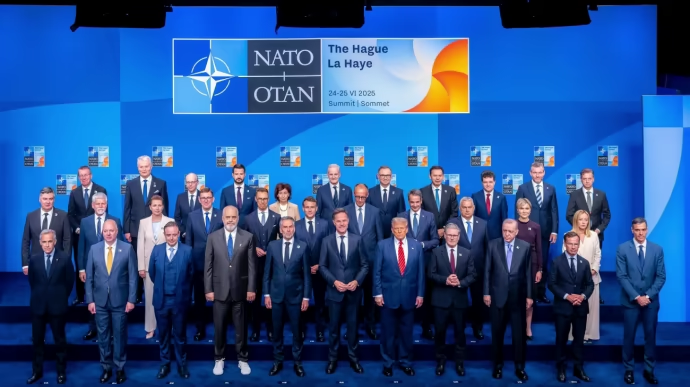The NATO summit in The Hague concluded with a consensus declaration that designates Russia as a “long-term threat to Euro-Atlantic security,” marking the first major alliance decision under Donald Trump’s presidency, according to Europeiska Pravda, which published the Ukrainian translation of the summit document.
The five-point declaration explicitly identifies Russia as the primary security challenge driving NATO’s commitment to increase defense spending to 5% of GDP by 2035.
“United in the face of deep security threats and challenges, including the long-term threat that Russia poses to Euro-Atlantic security, as well as the ongoing threat of terrorism, allies commit by 2035 to achieve annual investments of 5% of GDP on core defense needs,” according to the document.
Russia emerges as the only non-member state specifically named as a threat in the declaration, while China receives no mention despite Washington’s strategic focus on the Asia-Pacific region. The document was adopted by consensus, indicating unanimous support from all member states including the United States.
The summit took place amid uncertainty about Trump’s position on NATO’s collective defense provisions, with the US president stating en route to The Hague that he would announce his stance on Article 5 only during the summit. The final declaration removes any ambiguity: “We reaffirm our unwavering commitment to collective defense, enshrined in Article 5 of the Washington Treaty – an attack on one of us is an attack on all.”
Ukraine receives prominent mention as the second non-member state referenced in the document. “Allies confirm the permanence of their sovereign commitments to provide support to Ukraine, whose security is a contribution to our security,” according to the declaration.
NATO Secretary General Mark Rutte characterized this provision as part of Ukraine’s “bridge to membership” in the alliance, while confirming that the “irreversibility of Ukraine’s NATO membership” formula established under the Biden administration remains in effect.
The defense spending target breaks down into two components: 3.5% of GDP for core military capabilities and up to 1.5% for security-related infrastructure projects, critical infrastructure protection, and defense industry strengthening. Member states will submit annual plans demonstrating “credible progressive paths” toward meeting these targets.
The declaration includes a provision allowing members to count direct military aid to Ukraine and contributions to its defense industry toward their own defense spending calculations.
Hungary’s position on Ukraine support has been notably contentious. Prime Minister Viktor Orbán did not veto the Ukraine-related provisions, confirming his willingness not to block decisions on Ukraine when they have US administration support, according to the analysis.
The summit also addresses transatlantic defense industrial cooperation, with members committing to “eliminate barriers in defense trade between Alliance members.” However, the provision remains broadly worded without firm obligations, as countries like Türkiye face restrictions on purchasing high-tech American military equipment due to cooperation with the Kremlin.
The declaration concludes by setting the next two summits in Türkiye (2026) and Albania, marking consecutive meetings in Muslim-majority NATO members.
The Hague declaration reinforces themes from last year’s Washington summit, where under Biden’s presidency, the alliance similarly identified Russia and terrorism as direct threats, stating that “Russia remains the most significant and immediate threat to the security of Alliance member states.”
Read also:
- Defense News: Ukraine used a Pringles can to blow up a Russian tank
- Britain weaponizes seized Russian money to arm Ukraine with air defense missiles
- Ukraine clears 20% of mined territory since 2022, 137,000 sq km remain contaminated




